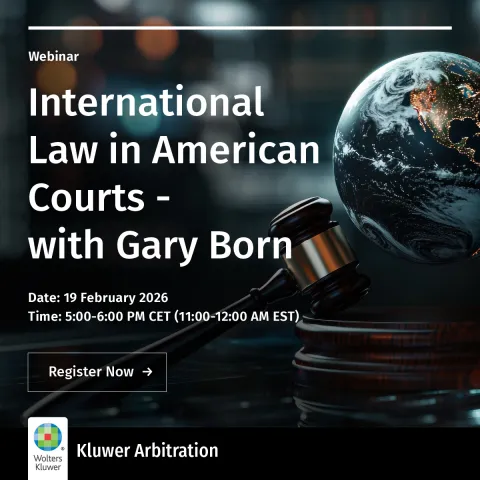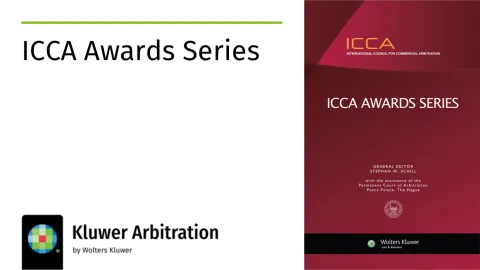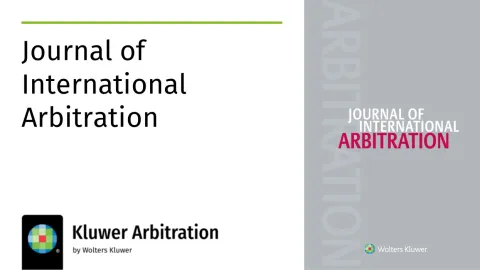XII CAM-CCBC Arbitration Congress: First Day—Contemporary Challenges and Innovations in Alternative Dispute Resolution
November 17, 2025
On October 20 and 21, 2025, the Center for Arbitration and Mediation of the Chamber of Commerce Brazil-Canada (“CAM-CCBC”) held its XII Arbitration Congress in São Paulo. The event featured five panels and two keynote speeches aimed to promote Alternative Dispute Resolution (“ADR”). The Congress was the opening event of a series of conferences on ADR, held in São Paulo, from 20 to 25 October, the São Paulo Arbitration Week.
This article presents key highlights from Congress’s opening remarks and the discussions held during the first three panels on October 20, 2025.
Rethinking Confidentiality: Insights from Professor Bjorklund’s Opening Keynote
The opening keynote speaker was Professor Bjorklund (McGill University Faculty of Law), who opened the Congress by emphasizing the arbitration community’s commitment to self-improvement but noted that introspection alone is not sufficient to address the complex and often amorphous challenges facing the field.
Professor Bjorklund keynote speech provoked an important reflection not only about importance of introspection and innovation in international arbitration, but also on how an investor reasonably evaluates a disputed asset when confidentiality remains the default standard. Professor Bjorklund went further by inviting the arbitral community to critically assess whether confidentiality should be blindly protected and prioritized over transparency in the disclosure of information. Confidentiality in arbitration is no longer universally endorsed; with growing debate over its adverse effects, particularly concerning awards. Professor Bjorklund keynote speech confirmed that the debate surrounding arbitration confidentiality has gained increasing prominence, prompting deeper reflection within the legal community.
Panel 1 | Strategic Drafting in M&A Contracts: Minimizing Dispute Risks and Enhancing Deal Certainty
Following the opening ceremony, the panelists André Abbud, Catarina Monteiro Pires, Kate Gonzalez, Pedro Chueiri, discussed best practices in drafting M&A contracts to mitigate dispute risks and increase the transaction legal certainty in a panel moderated by Marcela Levy.
This panel discussed the risks associated with the literal interpretation and Portuguese translation of specific vocabulary used in English-language M&A contracts, pointing out how often it fails to align with the intended legal meaning. The panel featured contributions from both litigation and M&A practitioners, encouraging an exchange of perspectives between them.
The core thesis was that international agreements are "necessarily incomplete" due to severe cost constraints and the intense pressure of cross-border negotiations (see also here). As mentioned above, this ambiguity is exacerbated when boilerplate language from one jurisdiction (e.g., Common Law) is imported into Brazil's Civil Law framework, often resulting in a conflict between the chosen vocabulary and the governing law. The panel highlighted two critical examples to illustrate the practical implications of contractual ambiguity:
First, the problem of qualifiers: adjectives like "reasonably asserted" are frequently used to define a standard of care. However, without objective, contractual criteria, this vocabulary is functionally meaningless, i.e., unless the contract defines what "reasonable" means (by setting a specific definition), the vague term simply grants broad interpretative discretion to the decision-maker.
Second, the panel addressed the interpretive tension that arises when broad 'catch-all' indemnity clauses are used alongside specific representations and warranties. In many cases, the catch-all indemnity clause, which holds the seller responsible for any losses arising from pre-closing circumstances, is often paired with specific (and often limited) representations and warranties. This creates ambiguity between the catch-all indemnity clause and representations and warranties, leading directly to disputes over which liability path should prevail.
The panel further emphasized the need for impeccable drafting to reduce the arbitrator’s discretion. In this context, the panel pointed out that counsel must attribute very clear contours to every obligation (e.g., price, deadlines, parties) and precise definitions to any adjectives used in the contract (e.g., knowledge, reasonably). Additionally, the M&A contract should expressly set out the definition of these ambiguous terms, such as “best knowledge,” by specifying which individuals involved in the transaction possess such knowledge in each case. The practitioners were also recommended to proactively draft against common subterfuges, such as extending non-compete restrictions to affiliates and related parties.
These discussions lead to a critical reflection for legal practitioners: clarity in contract drafting is not merely a technical concern—it is fundamental to legal certainty. Although bilingual contracts presented in dual-column may appear to mitigate linguistic ambiguities, literal translation often fails to capture the legal meaning across jurisdictions. Therefore, the interpretation may diverge due to the distinct legal concepts embedded in each jurisdiction’s party framework.
Indeed, in the context of cross-border transactions, the most effective approach is not only to translate words but to translate parties’ legal intent, to ensure that both parties extract the same meaning from the contract—moving beyond linguistic alignment to achieve precision in every clause.
Panel 2 | Unusual Intervention by Public Administration in Arbitration: Experiences and Challenges
The panelists Cristina Bichels Leitão, Eduardo Damião Gonçalves, Gustavo da Rocha Schmidt, and Paula Butti, discussed the possibility of Public Administration intervention in arbitration, presided over by Rodrigo Garcia da Fonseca. The panel offered a multifaceted perspective on the issue at hand, offering insights from both public administration and arbitration practitioners.
The panel focused on examining Intervenção Anômala in arbitration and clarified that it constitutes a specific type of intervention by the Public Administration as set forth in Article 5, sole paragraph, of Law No. 9,469, which authorizes public legal entities to intervene in proceedings whose decisions may have economic repercussions for the public interest without the need to demonstrate legal interest.
The Intervenção Anômala aims to elucidate factual and legal issues and allows the submission of documents and briefs. However, public legal entities do not become parties to the proceedings and, therefore, cannot submit claims, are not bound by res judicata, and lack standing to seek annulment of an arbitral award; and therefore, it cannot be mistaken for joinder in arbitration.
The panel further distinguished Intervenção Anômala from amicus curiae, clarifying that Intervenção Anômala is regarded as a statutory prerogative (or at least a privilege) of the Public Administration to intervene in cases whenever public economic or patrimonial interests are at stake. By contrast, the amicus curiae fulfills a consultative function, grounded in its technical expertise and generally associated with the defense of collective or social interests. The participation of an amicus curiae is subject to the tribunal’s discretion—a power that must be exercised with caution to avoid procedural disruption.
After the panel raised a procedural dilemma: what happens if an arbitral tribunal denies the Public Administration’s request to intervene? Paula Butti Cardoso argued that the Office of the General Counsel for the Federal Government views the Intervenção Anômala as a legal right. This information may be pivotal in shaping the tribunal’s approach, as it clarifies how such requests are viewed by the public administration.
Arbitration practitioners argued that the Intervenção Anômala is a privilege subject to strict limitations and not a right. They emphasized the autonomy of arbitration and cautioned that judicial interventions could jeopardize arbitration.
As this debate is still emerging and its analysis depends on the specific facts of each case, the discussion will evolve to allow and may reach a balance between the limits of arbitration when confronted with public interest (as previously occurred in arbitration involving public administration).
Panel 3 | The Future of Dispute Boards: Innovation, Effectiveness, and Global Trends
The future of dispute boards was discussed by the panelists Augusto Barros de Figueiredo, Krystle Baptista Serna, Marcela Randovic Cardova, and Rubes Rizek, and moderated by Marcelo Botelho de Mesquita.
The panel early confirmed that Dispute Boards (“DB”) are already a reality in Brazil (main Brazilian arbitration centers provide DB rules and services, e.g., CAM-CCBC, CAMARB, CAM-CIESP/FIESP, and FGV’s Mediation and Arbitration Center) and pointed out Public Administration growing adoption of DBs as a cost-effective tool for resolving disputes.
From a legal standpoint, the municipality of São Paulo was a pioneer in the use of DBs, having introduced DBs in municipal contracts by law in 2018 (and enacted regulations years later). Additionally, Belo Horizonte and Rio de Janeiro have also adopted local regulations authorizing the use of DB and Law No. 14,133/21 provides for the use of DBs at federal level, encouraging other municipalities to incorporate them into their contractual frameworks.
Although progress has been made, DBs still face major obstacles such as: (i) a cultural notion that the State is the ultimate decision-maker; (ii) public officials hesitate to authorize payments absent definitive resolution; (iii) an "intimate fear" that DB members are biased against the public interest. The panelists discussed the paradox surrounding DB in Brazil, as these obstacles overlook the fact that DBs are internationally recognized as an exceptionally effective, specialized, and economical tool for managing complex infrastructure disputes.
The panel outlined reasons supporting DBs as a best-practice model for managing complex projects, e.g., (i) statistics from the Dispute Resolution Board Foundation confirm that a minimal percentage of matters brought before DBs escalate to full arbitration; (ii) monitoring projects in real time and facilitating issue resolution, thereby preventing disputes and reducing costs; (iii) specialization (unlike generalist judges, DB members are technical experts such as engineers), offering rapid solutions with decisions issued within months.
For the panelists overcoming this paradox requires more than new laws; it requires mitigating concerns regarding potential bias and ensuring that control bodies provide clear directives that give legal certainty to good-faith public officials, fostering the trust needed to unlock DBs "great future.”
DBs are now facing the same prejudice that arbitration once did and it is necessary to revisit the lessons learned from the establishment of arbitration, to support the adoption of DB and more effectively overcome these cultural biases.
Conclusion
The first day of the XII CAM-CCBC Congress was marked by a compelling call for critical introspection, underscoring that arbitration, despite its consolidation as an effective dispute resolution mechanism, continues to face significant structural and cultural challenges in its practical implementation within the Brazilian legal landscape.
Collectively, the panels converged on the urgent need to recalibrate both theoretical and practical approaches to arbitration and ADR, aligning them with the emerging challenges, to reaffirm ADR´s role as an effective solution for complex disputes.
Follow along and see all of Kluwer Arbitration Blog’s coverage of the Congress here.
You may also like











